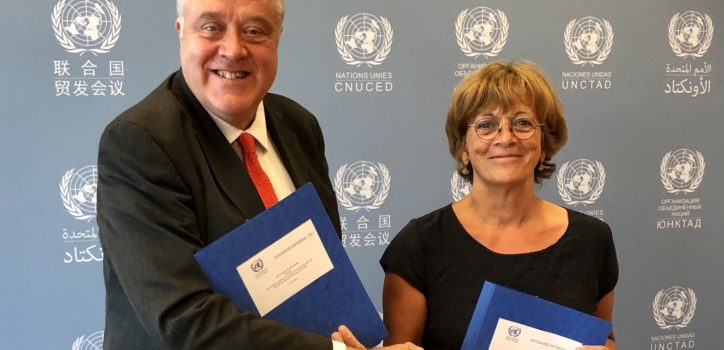Integrate SDGs in the company’s full reporting cycle, “not just the contents page” - new UNCTAD/IIRC initiative

The UN’s Sustainable Development Goals (SDGs) can and must be integrated in to corporate reporting, according to a new agreement signed by the United Nations Conference on Trade and Development (UNCTAD) signed this week.
UNCTAD and the International Integrated Reporting Council (IIRC) have today [Monday 3 June 2019] signed an updated memorandum of understanding (MoU), in which the two organisations will enhance their cooperation to integrate the SDGs into the corporate reporting cycle.
This action re-affirms the role of business in helping to achieve the SDGs, in particular Target 12.6 which specially commits to ‘integration in corporate reporting’ and drawing inspiration from Goal 12 on the need to ensure sustainable consumption and production patterns.
Integrated reporting is the concept of a more holistic form of reporting the value created by a business, which the IIRC’s coalition of business, investors and regulators is seeking to make the global norm, through reform of the corporate reporting system.
Responsible for addressing enterprise accounting and reporting issues in the UN system, UNCTAD has been active in assisting member States in developing a strong corporate reporting system to facilitate investment through its Intergovernmental Working Group of Experts on International Standards of Accounting and Reporting (ISAR). UNCTAD has been a supportive member of the IIRC Council, which acts as the focal point for developing a strong, effective, navigable and unified corporate reporting system, since the IIRC’s inception in 2010 and was part of the working group that developed the International <IR> Framework.
Under the enhanced collaboration, both organisations advocate that the SDGs provide business with a framework to translate global needs and ambitions into business solutions, helping companies to better manage operational and regulatory risks while also unlocking potentially historic market opportunities.
The updated MoU will see both organisations collaborating especially around the methodology for SDG Indicator 12.6.1 and in efforts to enhance support in the market.
Previously, UNCTAD and the IIRC collaborated on the UNCTAD project to provide ‘Core Indicators’ which are opening benchmarks for business reporting of the SDGs, and which were unveiled by UNCTAD at its ISAR 35th session last October.
IIRC Chief Executive Richard Howitt says:
“The IIRC encourages businesses to align their value creation models with the SDGs and use relevant metrics to measure and communicate on performance, (short term and long term). In order to achieve this and provide stakeholders with confidence, this is not just about the contents page of a report, but the pressing need for relevant and reliable information about business’ contribution to the SDGs which is fully integrated across the company and its reporting cycle”.
Ms. Isabelle Durant, Deputy Secretary-General of UNCTAD says:
“We are delighted to be continuing our effective collaboration with the IIRC. While challenges still remain with regard to how contributions to the SDGs can be more substantially integrated into corporate strategy and reporting, the International Integrated Reporting Framework serves as an effective and flexible tool for tackling the key challenges for businesses in goal 12 of the SDGs”.
Notes to Editors
Many businesses are already starting to integrate their performance against the SDGs in their mainstream annual report. The latest findings from the Global Sustainability Index Institute show 89% of top companies fully or partly report on the SDGs in their annual report, (https://mediadrawer.gvces.com.br/columbia/original/session-3-3-scr100_20184_2016-2017_comparison_update.pdf).
